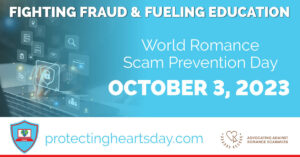Fraud is a form of exploitation that takes advantage of system vulnerabilities. This includes phishing attempts, stolen credit cards, copied bank account numbers, and check-washing. On the other hand, scams exploit a victim’s human vulnerabilities. Scams involve social engineering, manipulation, and participation by the victim, often leading to deep feelings of shame and regret. There are several ways a person can fall victim to being scammed. Being aware of scammer techniques and tools heightens awareness and helps prevent all types of fraud and scams.

What are internet scams?
Norton is a worldwide leader in device protection and cybersecurity products. In their blog, An overview + 20 internet scams to avoid in 2023, they state that “Online scams, also known as internet scams, continue to evolve and can vary widely. The term generally refers to someone using internet services or software to defraud or take advantage of victims, typically for financial gain.”
Who’s being scammed?
In December 2022, the Federal Trade Commission (FTC) published Who experiences scams? A story for all ages. The FTC reported that scams affect every age group but differently. However, every group is vulnerable to fraud and scams in their way.
According to their reporting, adults 60 and older are 16% more likely to be scammed by business imposters. Forty-five percent are more likely to be scammed by family and friends’ imposters, and 398% more likely to be caught up in a tech support scam! Their research also shows the older generations seem more susceptible to prizes, sweepstakes, and lottery scams.
But even so, younger generations are being scammed by initial contact through social media at almost double the rates: 31% of people ages 18-59 versus 15% of those 60 and older. Without education, none are protected from fraud and scams.

Call me! But what about phone scams?
Moreover, in contrast to the social media numbers, 24% of the older adults reporting said their scam began with a phone call. This is compared to only 10% of the younger people reporting. Unfortunately, those over 80 reported the phone call as the launch point to their scam at more than 40%.
AARP reports in this article that more than 59 million people lost money through phone scams in twelve months. The media loss in scams starting with a call is $1,200.00 higher than any other contact method.
Additionally, in the article, they list some of the warning signs to be mindful of when it comes to phone scams:
- Unsolicited calls from people claiming to work for a government agency, public utility, or major tech firms like Microsoft or Apple. These companies and institutions will rarely call you unless they have first communicated by other means or you have contacted them.
- Unsolicited calls from charity fundraisers, especially during the holidays and after disasters.
- Calls pitching products or services with terms that sound too good to be true. Common scam offers include free product trials, cash prizes, cheap travel packages, medical devices, pre-approved loans, debt reduction, and low-risk, high-return investments.
- An automated sales call from a company you have not authorized to contact you. That’s an illegal robocall and almost certainly a scam. (Automated calls are permitted for some informational or non-commercial purposes — for example, from political campaigns or nonprofit groups like AARP.)
Do’s and Don’ts of Phone Calls in 2023
Subsequently, AARP included some do’s and don’ts to keep top of mind when it comes to fraud and scams through phone calls:
- Do put your phone number on the FTC’s National Do Not Call Registry. It won’t stop spam calls, but it will make them easier to spot because most legitimate telemarketers won’t call you if you’re on the registry.
- Do consider using a call-blocking mobile app or device to screen your calls and weed out spam and scams. You can also ask your phone service provider if it offers any blocking tools.
- Do hang up on illegal robocalls.
- Do slow down and ask questions of telemarketers. Legitimate businesses and charities will answer questions and give you me to consider a purchase or donation. Scam callers will pressure you to commit right away.
- Do independently research travel deals, charities, or business and investment opportunities you hear about by phone.
- Don’t answer calls from unknown numbers.
- Don’t return one-ring calls from unknown numbers. These may be scams to get you to call hotlines in African and Caribbean countries that have U.S.-style three-digit area codes, and you could incur hefty connection and per-minute fees.
- Don’t follow instructions on a prerecorded message, such as “Press 1” to speak to a live operator (it will probably lead to a phishing expedition) or press any key to get taken off a call list (it will probably lead to more robocalls).
- Don’t give personal or financial data, such as your Social Security number or credit card account number, to callers you don’t know. If they say they have the information and just need you to confirm it, that’s a trick.
- Don’t pay registration or shipping charges to get a supposed free product or prize. Such fees are ploys to get your payment information.
- Don’t make payments by gift card, prepaid debit card, or wire transfer. Fraudsters favor these methods because they are hard to trace.

World Romance Scam Prevention Day
But I LOVE you! Broken Hearts and Empty Bank Accounts
Anthony Dohrmann, CEO of Electronic Caregiver, Inc., recently shared on his website advocacy page, “In 2022, an estimated 70,000 people were victims of romance scams, resulting in a shocking loss of $1.3 billion. This is a 164% rise from 2021. Since 2020, Americans have lost $3.3 billion to these scams.
Scammers looking for potential victims create profiles on varied platforms and initiate contact or wait for someone to contact them. They utilize internet fraud, phone calls, and text messages as just some of their tools. Once they find a target, they engage in conversations. This is the foundation of every fraud and scam. Relationships and building trust are integral. They build trust before scamming victims, causing emotional distress and financial loss. They often request payment through wire transfers, prepaid cards, gift cards, or Bitcoin ATMs.
According to a FINRA report, a quickly growing scam is the cryptocurrency romance scam, also known as pig butchering. “Such scams have grown dramatically in recent years, with individual investors sometimes losing hundreds of thousands of dollars.” Scammers create fake apps that display data to their victims, convincing them of their investment growth while stealing their funds.
It Became Personal
Mr. Dohrmann continued, “Having personally experienced the invasive effects of having my likeness stolen and used in romance scams, I understand the devastating emotional and financial toll this imposes on victims. I am determined to ensure no one else falls victim to such heartless manipulation on social media. Everyone should be armed with the tools to identify and thwart the advances of fraud and scams.
My team at Electronic Caregiver and I are committed to fighting against individuals who exploit genuine emotions for personal gain. We have joined forces with Advocating Against Romance Scammers (AARS), a valuable resource promoting a safer, more compassionate digital world. Together, we are working to combat the threat of romance scammers and making significant progress.”
It’s Your Identity!
If your identity has been stolen for use in romance scams, you know firsthand the troubles that come with it. Victims may report fraud and even turn to you to recover their stolen money. Some victims may even mistake you for the scammer and express anger and disgust toward you. As he shared in his August blog Romance Scams 2023, some challenges and issues arise when a person’s identity is stolen. But mainly when used to steal someone else’s money. Subsequently, for Anthony, it became personal quickly.
Larger scamming groups using teams of scammers have taken on a more sophisticated approach, engaging in corporate-like behaviors with those doing the scamming. Unfortunately, it is widely reported in 2023, it is suspected that more than 40% of scammers, primarily online, are themselves victims of human trafficking. Promised significant positions in other countries, unsuspecting ‘applicants’ arrive at their new employment destination only to be enslaved and abused and required to scam others for their survival.
Fraud, Scams, and Electronic Caregiver
Anthony Dohrmann and Electronic Caregiver (ECG) are noted for their innovative healthcare technologies for caring for the at-risk and the aging. By providing tools to become re-engaged and involved in their healthcare, ECG encourages and empowers those with chronic illness disabilities and those wanting to age well.
Accordingly, by taking a proactive stance in the fight against romance scams, Electronic Caregiver is doing what it does so well: providing care, protecting people, and encouraging others to strengthen their lives.
In-house and In Community
While in the early stages of developing the organization, Anthony Dohrman and ECG leadership insisted on starting with the customer first and working our way back. Processes are only rules, and products are only things when the human element is missing. And that concept includes safeguarding our customers against potential scams and identity theft and supporting victims of scams who contact us for assistance.
“As advancements in technology increase, so does the misuse of them. At ECG, we take security very seriously and adhere to best practices to secure our consumers’ data by conducting frequent security checks and penetration testing.” – Abel Salcido, Deputy Chief Technology Officer, Electronic Caregiver, Inc.
“With the same sense of care that permeates the organization, Electronic Caregiver staff handle scam victims gently, and kindly while linking them to reporting and healing resources they may be unaware of. It’s just another way to care for others, which is what we excel at in this company.” – Janice Hart, Director of Reputation Management, Electronic Caregiver, Inc.
Electronic Caregiver is a trusted entity in the fight against romance scams alongside other distinguished organizations. These include The Knoble, InfraGard, MatchGroup, AARP, Global Anti-Scam Alliance, Adam Levine, Forbes, Experian, MarketWatch, Norton, and many others.
Proactive to Protect, Especially the Elderly
In summary, scams are being perpetrated upon the unsuspecting every day worldwide. At Electronic Caregiver, we will always be committed to caring for the aging and the at-risk. Fighting against fraud, scams, and elderly financial abuse is one more way we can extend our hands of care to help others live well.
To that end, Electronic Caregiver is a Champion Sponsor of the inaugural World Romance Scam Prevention Day on October 3, 2023. The one-hour free webinar is being presented to help educate victims, fraud fighters, and potential victims. You can learn more about it and sign up for the free webinar. We hope you will join us in the fight to protect our at-risk and elderly.
